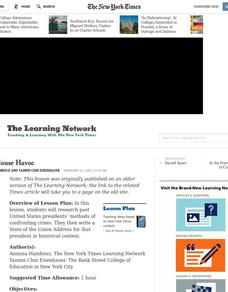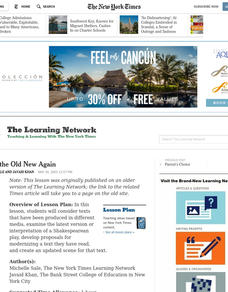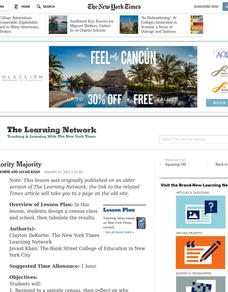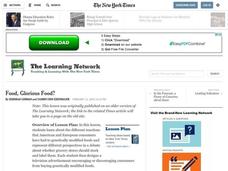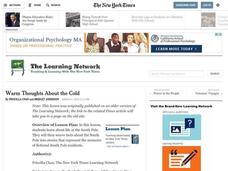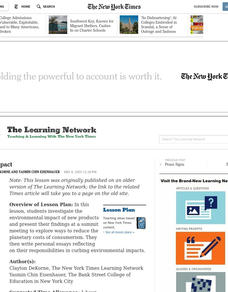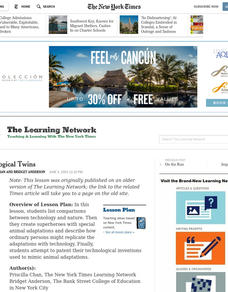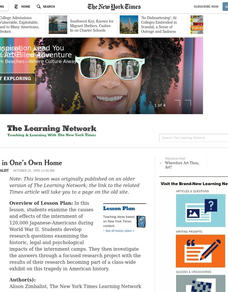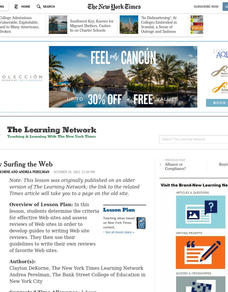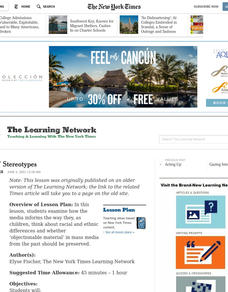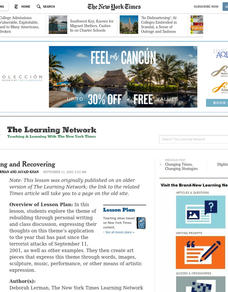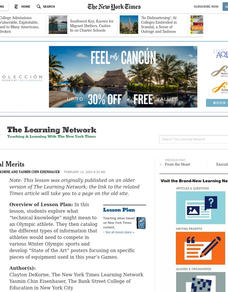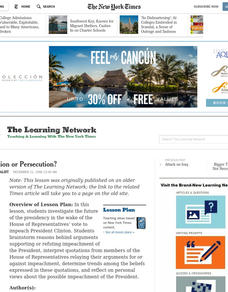Curated OER
Pandemic Panic
Students gather information about the H1N1 virus, and share this information. In this pandemic lesson students read about Influenza A, or Swine Flu, compile information on the disease, and then present their findings to the class.
Curated OER
White House Havoc
The president of the United States must be able to keep a cool head in moments of crisis to lead his or nation out of the darkness. A history instructional activity encourages learners to study the ways various presidents have handled...
Curated OER
Budget Busters
Use this economic activity to focus on writing summaries of informational text. First, middle schoolers define common economic terms used to describe news about the economy. They closely read news about the federal budget deficit and...
Curated OER
Making the Old New Again
How does a new version of a Shakespearean play change in the adaptation process? Use this New York Times' Learning Network instructional activity to consider texts that have been produced in different media. Middle schoolers examine the...
Curated OER
The Minority Majority
Students design a census class and school, then tabulate the results. They respond to a sample census, then reflect on why questions of race and national origin are different.
Curated OER
Food, Glorious Food?
How are the reactions between American and European consumers different when it comes to genetically modified foods? Use the New York Times article "Consumers in Europe Resist Gene-Altered Foods" to inform your middle schoolers about the...
Curated OER
Warm Thoughts About the Cold
“What do you think life is like at the South Pole?” After responding to this journal prompt, class members read and discuss the New York Times article, “At South Pole, New Home for a New Era.” Using resources available from the Times’...
Curated OER
Deep Impact
How can acknowledging opposing viewpoints reinforce one's argument? Use this New York Times lesson to study consumerism and the environmental impact of new products. After reading the article "Whether a Hummer or a Hybrid, the Big...
Curated OER
Let There Be Peace: Nobel Prize Winners
What is the Nobel Peace Prize? After they establish criteria for great leadership, secondary learners read a New York Times article about President Jimmy Carter's acceptance of the Nobel Peace Prize in 2002. Individuals research the...
Curated OER
Fit to Be Tied (In)
How do the films we watch affect our purchasing behavior? Considering the profiles of given consumer demographics, the class analyzes real advertisements and the effectiveness of their power on consumerism. THey create posters that...
Curated OER
Technological Twins
Learners list comparisons between technology and nature. Then they create superheroes with special animal characteristics and describe how ordinary persons might replicate the changes with technology.
Curated OER
Prisoner in One's Own Home
Examine the internment of Japanese-Americans during World War II. After reading an article from the New York Times and exploring the author's word choice, young readers find the central idea in the text and work on researching additional...
Curated OER
Get the Message?
Remember Morse Code? High schoolers investigate ways in which people communicate and assess which communication methods are appropriate and effective in different situations. They evaluate how constant changes in the world of technology...
Curated OER
Showdown in the New Wild West
What is the root of the conflict between ranchers and environmentalists? Middle schoolers write their impressions of what an environmentalist is and does. They read the New York Times article "In New Wild West, It's Cowboys vs. Radical...
Curated OER
Critically Surfing the Web
The New York Times article “Online Diary,” launches this study of websites and how to assess them. Richly detailed, the lesson includes warm-up activities, procedures, journal prompts, discussion questions, and links to valuable...
Curated OER
Sufferin' Stereotypes
Examine how the media informs the way your class thinks about racial and ethnic differences. Additionally, middle and high schoolers discuss whether "objectionable material" in mass media from the past should be preserved.
Curated OER
The Scoop on Local Business
How do local businesses support their state or regional economy? The New York Times has prepared another great lesson for your class. They begin by listing products grown or manufactured in their state or region then write interview...
Curated OER
Don't Believe the Type: Internet Ethics
What is Internet fraud? Explore Internet ethics and engage in a collaborative discussion. In order to create a Guide to Internet Honesty, learners read and discuss the article "A Beautiful Life, A Tragic Death, a Fraud Exposed." Then...
Curated OER
Rebuilding and Recovering
What does it mean to rebuild and recover after a major event? Your class will explore this theme while they discuss and discover the events surrounding September 11. They will also look at other examples and then create art pieces that...
Curated OER
Technical Merits
What is technical knowledge? The class explores what technical knowledge might mean to an Olympic athlete. They catalog the different types of information that athletes would need to compete in various Winter Olympic sports and develop...
Curated OER
That's Moor Like It!
How do modern adaptations of Shakespearean plays relate to their original source material? Middle and high schoolers focus on Shakespeare's play Othello and its screen adaptation "O" to explore how modern film adaptations of Shakespeare...
Curated OER
Prosecution or Persecution
Investigate the future of the presidency in the wake of the House of Representatives' vote to impeach President Clinton. The class brainstorms both sides of the argument, reads and discusses an article, then analyzes and writes a journal...
Curated OER
Steer Clear of Trouble
Inform teenagers about safe driving techniques. Young journalists use the Internet to investigate safe driving practices and technologies then publish a manual for the teen drivers in their life.
Curated OER
Validating Votes
Explore the discrepancies in Florida's vote counting process in 2000 and 2002 with this New York Times reading lesson. Middle schoolers study the viewpoints presented in informational text, paying attention to how word choice can...
Other popular searches
- Media Education Blogging
- Blog Simulation
- Web Blogs
- Creating Blogs
- Using Wiki and Blogs
- English Using Blogs
- Blogs About Overeating
- Learning to Blog
- Blog Science
- How to Blog
- Using Blogs
- Blogs in the Classroom



